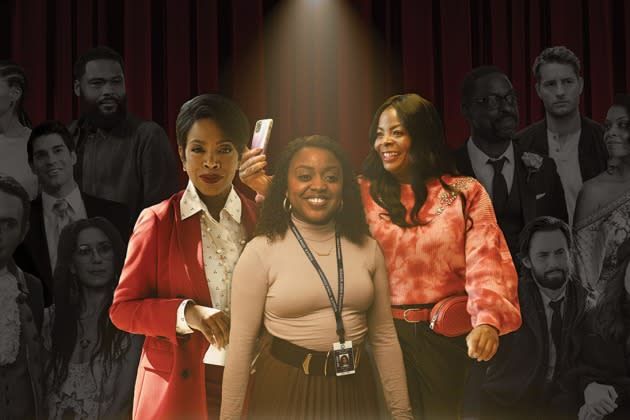Emmys: Why Do Broadcast Networks Want to Air Their Own Funeral?

Imagine you’re a senior citizen who, with a few contemporaries, hosts an annual end-of-the-summer luncheon at your retirement community. One year, a group of much younger people crashes the party and helps itself to some of your food and drinks. As a kind gesture, you invite them back the next year, only this time they show up with more friends and consume a much larger share of your food and drinks. You’re a little annoyed, but you invite them back again. This time, they and even more friends make off with virtually all your food and drinks. And then you invite them back again.
That wouldn’t make much sense, but it’s essentially what’s happened with the Emmys.
More from The Hollywood Reporter
First presented in 1949, during television’s infancy, to celebrate Los Angeles-area shows, the ceremony began recognizing nationally televised work in 1952. Three years later, the ceremony itself began to be nationally televised, and since 1995 it has aired on a “wheel rotation,” cycling among today’s Big Four major broadcast networks — stations available “over the air” for free, which I’ll henceforth refer to as network — ABC, CBS, NBC and Fox, an arrangement most recently renewed in 2018 for eight years.
For decades after the reimagination of the Emmys in 1952, every nominee and winner hailed from a network (a classification that also used to include DuMont and now includes PBS and The CW) or was syndicated. Then, in 1988, cable programming became eligible — in the series categories, its first comedy nominee was HBO’s The Larry Sanders Show in 1993, first drama nominee was HBO’s The Sopranos in 1999, first comedy winner was HBO’s Sex and the City in 2001 and first drama winner was The Sopranos in 2004. And 20 years after that, in 2008, streaming was invited to compete. Among its firsts: drama nominee House of Cards (Netflix) in 2013, comedy nominee Orange Is the New Black (Netflix) in 2014, drama winner The Handmaid’s Tale (Hulu) in 2017 and comedy winner The Marvelous Mrs. Maisel (Amazon Prime) in 2018.
In the era of “Peak TV,” with more than 500 scripted shows released each year, the TV Academy has expanded the number of nominees for best drama and best comedy from five to six in 2008, seven in 2015 and eight in 2020. Not even that has masked the fact that network shows account for a much smaller piece of the pie than they used to, and also that they no longer appeal to Emmy voters in the way they used to.
The last network show to win best drama was Fox’s 24 in 2006 and best comedy was ABC’s Modern Family in 2014. The last time more than one was nominated for best drama was in 2010 (CBS’ The Good Wife and ABC’s Lost) and for best comedy was in 2017 (ABC’s Black-ish and Modern Family). And as far back as 2012, and many times since, not a single one was among the best drama nominees.
But the networks have never had as poor a showing at the Emmy nominations as they did this year. The Big Four collectively garnered 86 noms — 29 for CBS, 28 for NBC, 23 for ABC and six for Fox — which is less than the individual totals of HBO/HBO Max (140) and Netflix (105). Also outscoring any of the networks: Hulu (58), Apple TV+ (52), Disney+ (34) and Amazon Prime (30).
Networks accounted for only one of 16 drama or comedy nominees, that one being ABC’s rookie comedy Abbott Elementary (NBC’s drama This Is Us and ABC’s comedy Black-ish fell out of the top races after being nominated last year). It also nabbed one of 24 slots for lead drama or comedy acting, going to Abbott Elementary’s Quinta Brunson for lead comedy actress. None of the 14 slots for drama or comedy directing went to a network show, and only one of 15 slots for drama or comedy writing did — Brunson again.
Why is this happening? Network shows, unlike those on pay cable or streaming, continue to be packed with commercials, restricted in what they can say or show, feature long seasons that roll out slowly and rarely tell continuing stories (to improve their prospects for syndication). Not coincidentally, they’re less popular with the coastal intelligentsia and media whose tweets and articles serve a curatorial function for Emmy voters.
Last year, CBS aired an Emmys telecast during which the networks won just one award, best variety sketch series, for NBC’s Saturday Night Live, and, for the first time, all three series awards were won by streamers. Networks’ prospects at this year’s Emmys, which NBC will air Sept. 12, look no better.
Which begs the question: Why do the networks want to air a three-hour commercial for their competition? (They were reportedly very unhappy years ago when only the TV movie and miniseries categories were being overrun by cable; now network shows account for a minority of slots in virtually every genre but variety.) My hunch is they don’t and aren’t going to re-up the wheel rotation after it expires in 2026 unless some major changes occur — perhaps the introduction of best network drama and best network comedy categories. (There are already hundreds of Emmy categories, so what’s two more?)
And whether the networks make — or the TV Academy acquiesces to — such demands, I’d also expect others to bid on the Emmys. HBO reportedly made an offer in 2002 but was turned down. I doubt its interest has diminished or that a streamer wouldn’t also want in. If one of them ends up with the Emmys, well, to come back to the analogy with which we began, the kids truly will have eaten the seniors’ lunch.
This story first appeared in the July 20 issue of The Hollywood Reporter magazine. Click here to subscribe.
Best of The Hollywood Reporter

